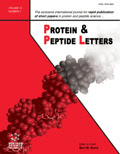
Proteomes
Scope & Guideline
Unveiling the Complexity of Proteins.
Introduction
Aims and Scopes
- Proteomic Analysis of Biological Samples:
The journal publishes studies that utilize proteomic techniques to analyze various biological samples, including tissues, fluids, and cells, to uncover insights into biological processes and disease mechanisms. - Integration of Multi-Omics Approaches:
A consistent focus on the integration of proteomics with other omics disciplines such as genomics and metabolomics, allowing for a more comprehensive understanding of biological systems and disease states. - Clinical Applications of Proteomics:
Research that translates proteomic findings into clinical applications, particularly in the identification of biomarkers for disease diagnosis, prognosis, and treatment, is a core area of interest. - Technological Advancements in Proteomics:
The journal highlights innovative methodologies and technological advancements in proteomics, including mass spectrometry, bioinformatics, and sample preparation techniques, which enhance the capabilities of proteomic studies. - Proteomics in Environmental and Agricultural Studies:
The journal also explores the application of proteomics in environmental science and agriculture, focusing on plant and microbial proteomics to address challenges in food security and sustainability.
Trending and Emerging
- Cancer Proteomics and Personalized Medicine:
A significant increase in studies focusing on cancer proteomics, particularly in relation to personalized medicine and the identification of specific biomarkers for various cancer types, shows the journal's commitment to addressing cancer-related challenges. - Integration of Proteomics with Artificial Intelligence and Machine Learning:
Emerging research that applies AI and machine learning techniques to proteomics data analysis demonstrates a growing trend towards computational approaches, enhancing data interpretation and biomarker discovery. - Proteomics in Neurodegenerative Disease Research:
An increased focus on the role of proteomics in understanding neurodegenerative diseases, including Alzheimer's and Parkinson's, highlights the journal's alignment with pressing health issues and the quest for effective therapeutic strategies. - Environmental and Ecological Proteomics:
There is an emerging interest in the application of proteomics in environmental and ecological studies, addressing issues such as climate change, plant stress responses, and microbial interactions, reflecting a broader understanding of biological impacts on ecosystems. - Post-Translational Modifications (PTMs) Research:
Research on post-translational modifications, particularly in relation to their functional implications in diseases and cellular processes, is gaining traction, indicating a trend towards understanding the complexity of protein regulation.
Declining or Waning
- Basic Proteomics Methodologies:
There has been a noticeable decrease in publications solely focused on basic proteomics methodologies without an application context, as the field has shifted towards more integrative and applied studies. - Single-Organism Proteomics Studies:
Research focusing exclusively on the proteomics of single organisms, especially non-human models, has diminished, with a greater emphasis now on comparative and integrative studies across species. - Classical Biomarker Studies:
Traditional approaches to biomarker discovery that rely heavily on single-protein analysis have waned, giving way to more complex multi-omics strategies that consider the interplay of multiple biological molecules. - Proteomics in Non-Clinical Settings:
The application of proteomics in non-clinical settings, such as basic research without direct implications for health or disease, has seen a decline as the journal moves towards a more clinically relevant narrative.
Similar Journals

PROTEIN JOURNAL
Exploring the Frontiers of Protein ScienceProtein Journal, published by Springer, stands as a significant academic resource in the fields of Analytical Chemistry, Biochemistry, Bioengineering, and Organic Chemistry. Since its inception in 1996, the journal has dedicated itself to the dissemination of high-quality research focused on protein chemistry and its biomedical applications. With an impressive impact reflected in its classification as a Q2 journal in Analytical Chemistry and Q3 in both Biochemistry and Bioengineering as of 2023, it provides an essential platform for researchers and practitioners to share their findings. The journal embraces the open-access model, enhancing accessibility to cutting-edge research. The Protein Journal is crucial for academicians, industry professionals, and students, catering to their need for rigorous scientific discourse and innovative discoveries in protein studies. With an established track record of converging over two decades of knowledge and research, it continues to influence and shape the advancements in this vital area of science.

PROTEIN AND PEPTIDE LETTERS
Exploring the forefront of biochemistry and structural biology.PROTEIN AND PEPTIDE LETTERS is a prominent peer-reviewed journal published by Bentham Science Publishers Ltd, specializing in the dynamic fields of biochemistry and structural biology. With an ISSN of 0929-8665 and a corresponding E-ISSN of 1875-5305, the journal has been a pivotal platform for researchers since its inception in 1994. Spanning various aspects of protein and peptide research, it aims to disseminate groundbreaking findings that enhance our understanding of molecular mechanisms and therapeutic applications. Although categorized in the Q3 quartile for biochemistry and medicine, and Q4 in structural biology within the 2023 metrics, it remains a valuable resource in the academic arena, offering insight into the latest research and advancements. As the journal converges towards its 2024 milestone, it continues to reflect the evolving landscape of molecular research. While it currently does not offer open access, the accessibility to its impactful content is essential for students, professionals, and researchers invested in these critical scientific disciplines.

Journal of Biochemistry
Where groundbreaking biochemistry research comes to life.Journal of Biochemistry, published by Oxford University Press, is a prestigious academic journal that has been at the forefront of biochemical research since its inception in 1922. With an ISSN of 0021-924X and an E-ISSN of 1756-2651, this journal serves as a platform for disseminating high-quality research in the fields of biochemistry, molecular biology, and medicine, holding impressive rankings such as Q2 in Biochemistry and Medicine (miscellaneous) in 2023. As of 2024, the journal continues to explore significant topics in these areas, offering valuable insights for researchers, professionals, and students alike. The journal does not currently offer open access, but it remains a vital resource for anyone in the biochemical community seeking to stay updated on the latest discoveries and advancements. With its rich history and dedication to scientific excellence, the Journal of Biochemistry is an indispensable part of the scholarly landscape.

ACS Chemical Biology
Unraveling the Chemistry Behind Biological InnovationACS Chemical Biology is a premier journal published by the American Chemical Society, dedicated to advancing the understanding of the chemical underpinnings of biological systems. With an ISSN of 1554-8929 and a distinguished track record since its inception in 2006, this journal provides a vital platform for the dissemination of high-quality research in the realms of biochemistry and molecular medicine, achieving a prestigious Q1 ranking in these categories as of 2023. In an era where interdisciplinary approaches are crucial, ACS Chemical Biology fosters collaboration among chemists and biologists, reflecting a steadfast commitment to exploring the chemical processes that govern life. Although it does not operate under an open-access model, the journal maintains a rigorous peer-review process, ensuring the publication of influential studies that shape the future of chemical biology. With an increasing impact factor and a focus on innovative research, ACS Chemical Biology remains an authoritative resource for researchers, professionals, and students eager to engage with cutting-edge findings in this dynamic field.

All Life
Championing Collaboration in Biological ResearchAll Life is a distinguished academic journal published by TAYLOR & FRANCIS LTD, based in the United Kingdom, focusing on the interdisciplinary realms of agricultural and biological sciences, biochemistry, genetics, and neuroscience. With the ISSN 2689-5293 and E-ISSN 2689-5307, this open-access journal aims to disseminate high-quality research from 2020 to 2024, facilitating a wider reach and impact across various fields. Notably, it holds a Q3 ranking in both Agricultural and Biological Sciences, as well as Biochemistry, Genetics and Molecular Biology, and a Q4 ranking in Neuroscience, reflecting its growing presence in these disciplines. All Life aims to foster collaboration among researchers, professionals, and students, encouraging innovative approaches in understanding life sciences. By delivering timely insights and thought-provoking discussions, the journal plays a crucial role in advancing knowledge and promoting interdisciplinary dialogue in the evolving landscape of life sciences research.

Journal of Integrative Bioinformatics
Advancing the Frontiers of Bioinformatics ResearchJournal of Integrative Bioinformatics, published by WALTER DE GRUYTER GMBH, is a leading open-access journal that has been at the forefront of the field since its inception in 2004. With an E-ISSN of 1613-4516, it serves as a crucial platform for researchers engaged in the interdisciplinary study of bioinformatics, blending insights from biology, computer science, and mathematics. Based in Germany, the journal is recognized for its impact in the realm of general medicine, boasting a Scopus rank of #172 out of 636 and placing in the 73rd percentile of its category. The journal continuously strives to disseminate high-quality research contributions that unify experimental and computational approaches to address complex biomedical questions. Targeted towards academics, professionals, and students alike, the Journal of Integrative Bioinformatics provides essential access to innovative research that enhances our understanding of integrative methodologies in medicine and beyond, especially with converged years spanning from 2008 to 2024.

JOURNAL OF PROTEOME RESEARCH
Connecting Scholars through Protein Research ExcellenceJOURNAL OF PROTEOME RESEARCH is a premier publication in the field of proteomics, disseminating cutting-edge research and methodologies that drive advancements in biochemistry and molecular biology. Published by the American Chemical Society, this esteemed journal boasts a robust impact, as evidenced by its Q1 rankings in both Biochemistry and miscellaneous Chemistry categories for 2023. With a reputation bolstered by a solid Scopus ranking—#64 out of 408 in General Chemistry and #80 out of 438 in Biochemistry—the journal serves as an essential resource for researchers, professionals, and students aiming to deepen their understanding of protein functions and interactions in biological systems. Although it does not operate under an open-access model, the JOURNAL OF PROTEOME RESEARCH remains a critical platform for scholarly discourse, committed to publishing high-quality, peer-reviewed articles through 2024 and beyond. Scholars are encouraged to engage with the pioneering studies and reviews that shape the future of proteomics.

COMPUTATIONAL BIOLOGY AND CHEMISTRY
Exploring the Nexus of Biology and Chemistry through Computational InnovationCOMPUTATIONAL BIOLOGY AND CHEMISTRY is a distinguished academic journal published by Elsevier Science Ltd, focusing on the dynamic intersection of computational biology, biochemistry, and chemistry. With an ISSN of 1476-9271 and an E-ISSN of 1476-928X, this journal is committed to disseminating high-quality research that employs computational techniques to solve complex biological and chemical problems. As of 2023, the journal holds a substantial impact factor reflecting its significance and rigorous peer-review process, categorized in the Q2 quartile for both Computational Mathematics and Organic Chemistry, alongside Q3 classifications in Biochemistry and Structural Biology. With a continuous publication history spanning from 2003 to 2024, it serves as a critical resource for researchers, professionals, and students alike. The journal offers various open access options, ensuring that vital research findings are accessible to a global audience, further enhancing collaboration across disciplines. Engage with cutting-edge studies and contribute to the evolving landscape of computational methodologies in the life sciences through this esteemed publication.

Cell Chemical Biology
Unlocking Innovations in Life Sciences.Cell Chemical Biology, published by Cell Press, stands at the forefront of interdisciplinary research in the realms of biochemistry, molecular biology, and pharmacology. With a robust impact factor evident in its prestigious Q1 quartile rankings across multiple categories including Clinical Biochemistry and Drug Discovery for 2023, this journal serves as a critical platform for disseminating cutting-edge scientific discoveries. As an Open Access publication, it ensures that vital research is accessible to a wide audience, fostering collaborations and driving innovation in the life sciences. Based in the United States, and featuring publications from 2016 to 2024, Cell Chemical Biology invites researchers, professionals, and students alike to contribute to its mission of advancing knowledge through rigorous peer-reviewed articles that address both fundamental and applied aspects of chemical biology.

Biomarker Insights
Exploring innovative pathways in biomarker discovery.Biomarker Insights, published by SAGE Publications Ltd, is a leading open-access journal dedicated to advancing the field of biomarker research and its applications in health and disease. With an ISSN of 1177-2719 and an E-ISSN of 1177-2719, this journal has been at the forefront of disseminating high-quality scientific findings since its inception in 2006. Based in New Zealand, it has achieved a notable impact within the academic community, ranking in Q2 for Biochemistry (medical) and Molecular Medicine, and Q1 in Pharmacology as of 2023. This positions Biomarker Insights as a critical resource for researchers, professionals, and students alike, looking to explore innovative methodologies and applications in biomarker discovery and validation. With a commitment to open access, the journal ensures that groundbreaking research is readily available to the global community, fostering collaboration and innovation in the ever-evolving field of biomedical sciences.